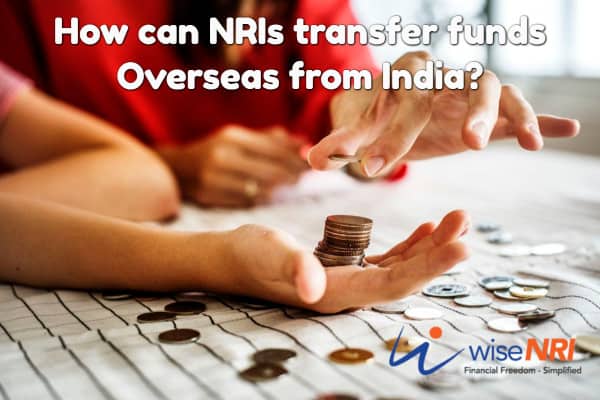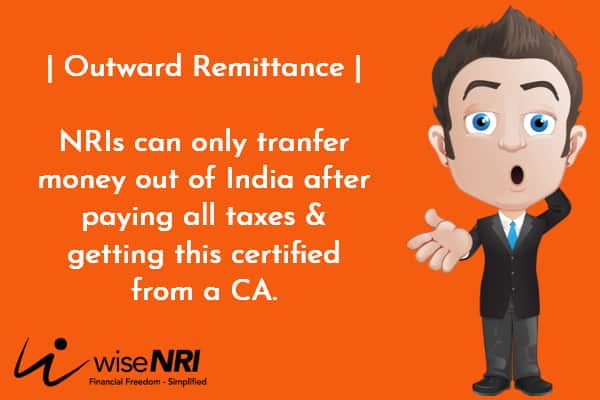Should We Transfer Money To Nre Account Before Moving Permanently To India
Why Financial Planning?
Planning is bringing the future into the present so that you can do something about it NOW.
How can NRIs transfer funds Overseas from India?
NRIs live abroad and earn money abroad but many of them have money in India through passive earning such as rent or through the sale of investments and property. It is possible for them to transfer these funds outside India provided they follow the regulations laid down by RBI.

Read – Gift by NRIs to Resident Indian & vice Versa
Repatriation or Outward Remittance India
Sending money abroad is known as repatriation or outward remittance. It can be done through your banking channel only either using online services or via demand drafts or cheques. You cannot use the services of money transfer agents.
NRIs will not have a resident Indian bank account. So their earnings in India will be credited to the NRO account. NRIs who do not have plans to come to India for good in the near future will not have much use of the money lying idle in the NRO account.
To help them use it effectively, the Reserve Bank of India (RBI) allows an amount of up to USD 1 million per financial year from the NRO account to the NRE account. The limit includes the payment of applicable taxes.
If an NRI sells a residential or commercial property, the amount that was brought in India to buy the property can be freely repatriated. The amount would have been brought in via an NRE account. It should be noted that proceeds of the sale of only two properties can be repatriated.
If the NRI brings in money from abroad to repay the home loan amount taken to buy the property, the bank from which he took the loan will allow him to freely repatriate an equivalent amount to what was brought in the country from abroad.
There can be cases where the NRI has made an investment in India using funds that were brought in India from abroad and then sells it. The sales proceeds of such investment can be repatriated freely after paying capital gains tax if applicable.
Interest earned and account balance in NRE and FCNR accounts can be freely repatriated abroad.
Must Check –Power of Attorney for NRI
Rules For Transfer of Money from India –
An NRI has to follow certain rules to transfer his money from India to the foreign country where he is residing –
- The NRI has to fill up and submit Form 15CA Format (online application form) and Form 15CB (Chartered Accountant Application) to the bank branch to transfer money from India to a foreign country.
The 15ca format form can be accessed here –
Form 15CA
Also Read – NRI Joint Account with Resident Indian
Form 15CB – Login to the portal and access the 'forms' section. This form is required only in certain conditions. For example, it is not required when the remittance is less than 50,000 in one transaction and less than 2,50,000 overall in one financial year
- The exchange rates prevailing at the time of processing the repatriation request will be applicable.
- It is important to give correct bank account details for the repatriation request as the bank in India might not be able to validate the details of a foreign bank account.
- It will take two working days for the transfer to get completed.
Most banks in India allow NRIs to transfer funds from India to the country they are living in.

Exceptions
Theoretically, there are many exceptions where you don't require form 15ca & 15cb but my interaction with many NRIs & few CAs make me believe that bankers don't want to take any risk when it comes to NRI issues. You can share your views in the comment section.
Check – Status of NRE FD after returning to India
Double Taxation Avoidance Agreement (DTAA)
If your remittances consist of interest from an NRO deposit, the bank is required to deduct tax at the source of the interest at the rate of 30%. Suppose you live in the US or UK or any other country that has a DTAA with India, then you are eligible for a reduced TDS rate of 15%.
The bank will require you to submit a Tax Residency Certificate from your country of residence if you want to avail of this reduced rate.
The basis of DTAA is that a particular income is taxed in both countries. There are scenarios of DTAAs that India has signed with countries that do not have personal tax. However, there are instances where a foreign country may not levy a personal tax on its residents, yet India has a DTAA with those countries that allow NRIs of those countries to avail a reduced rate of TDS.
In such cases, each bank might have its own way of handling this. Some banks like the State Bank of India require you to submit a declaration form if you reside in a country that has a zero tax but has a DTAA with India that offers a lower rate of TDS. On submitting this self-declaration, the bank will deduct tax at the source at the reduced rate instead of the mandated 30%.
Please share your experience regarding outward remittance. If you have any questions related to repatriation – feel free to add them in the comment section.

Published onNovember 25, 2021
Hemant Beniwal is a CERTIFIED FINANCIAL PLANNER and his Company Ark Primary Advisors Pvt Ltd is registered as an Investment Adviser with SEBI. Hemant is also a member of the Financial Planning Association, U.S.A and registered as a life planner with Kinder Institute of Life Planning, U.S.A. He started his Financial Planning Practice in 2009 & is among the first generation of financial planners in India. He also authored Bestseller book "Financial Life Planning".
Should We Transfer Money To Nre Account Before Moving Permanently To India
Source: https://www.wisenri.com/outward-remittance-nri-form-15ca-15cb/
Posted by: abramsonmessled.blogspot.com

0 Response to "Should We Transfer Money To Nre Account Before Moving Permanently To India"
Post a Comment